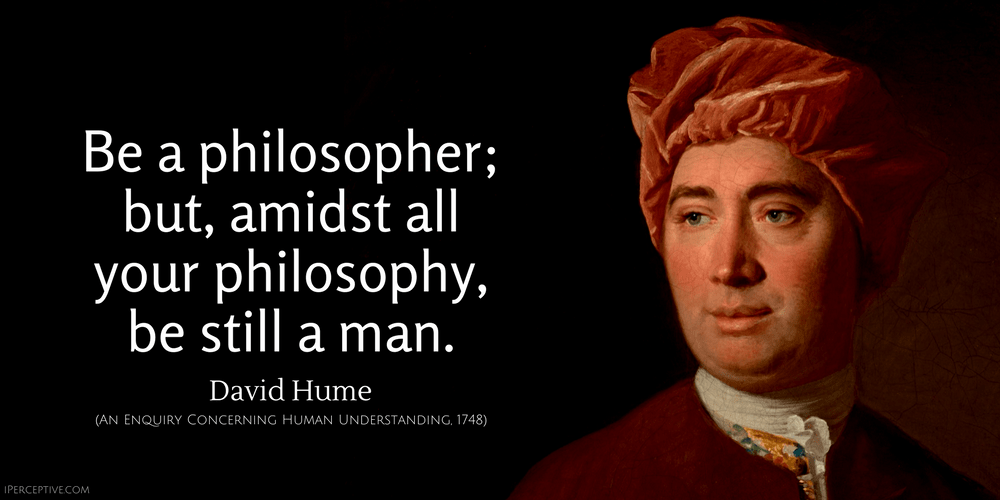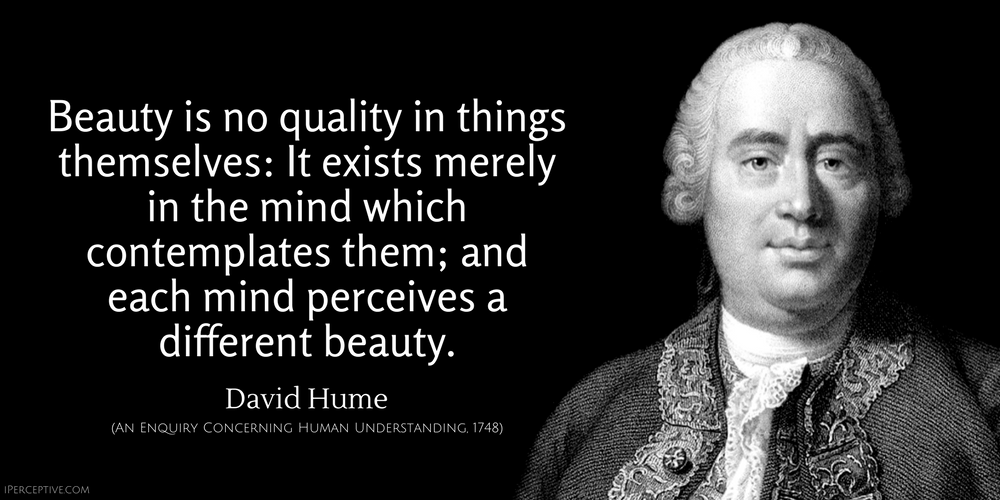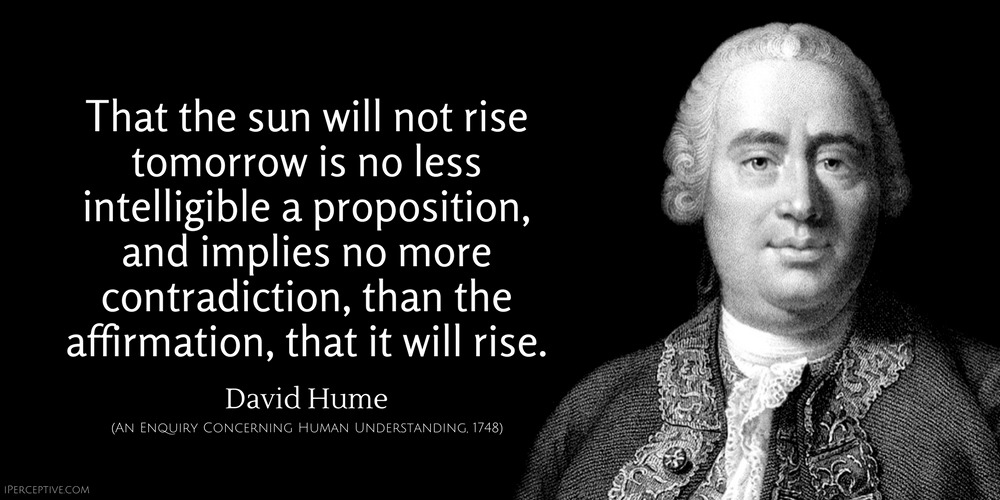David Hume Quotes

Be a philosopher; but, amidst all your philosophy, be still a man.
Beauty in things exists in the mind which contemplate them.
Everything in the world is purchased by labor.
Men often act knowingly against their interest.
The corruption of the best things gives rise to the worst.
To hate, to love, to think, to feel, to see; all this is nothing but to perceive.
Custom, then, is the great guide of human life.
A wise man proportions his belief to the evidence.
Art may make a suit of clothes; but nature must produce a man.
It is seldom, that liberty of any kind is lost all at once.

Beauty is no quality in things themselves: It exists merely in the mind which contemplates them; and each mind perceives a different beauty.
But the life of a man is of no greater importance to the universe than that of an oyster.
Nothing is more surprising than the easiness with which the many are governed by the few.
Scholastic learning and polemical divinity retarded the growth of all true knowledge.
Human Nature is the only science of man; and yet has been hitherto the most neglected.
Generally speaking, the errors in religion are dangerous; those in philosophy only ridiculous.
Nothing indeed can be a stronger presumption of falsehood than the approbation of the multitude.
Victory is not gained by the men at arms, who manage the pike and the sword; but by the trumpeters, drummers, and musicians of the army.
Eloquence, when at its highest pitch, leaves little room for reason or reflection; but addressing itself entirely to the fancy or the affections, captivates the willing hearers, and subdues their understanding.
There is nothing which is not the subject of debate, and in which men of learning are not of contrary opinions.
A man acquainted with history may, in some respect, be said to have lived from the beginning of the world, and to have been making continual additions to his stock of knowledge in every century.
In all ages of the world, priests have been enemies to liberty; and it is certain, that this steady conduct of theirs must have been founded on fixed reasons of interest and ambition.
Belief is nothing but a more vivid, lively, forcible, firm, steady conception of an object, than what the imagination alone is ever able to attain.
Morals excite passions, and produce or prevent actions. Reason of itself is utterly impotent in this particular. The rules of morality, therefore, are not conclusions of our reason.
There is a very remarkable inclination in human nature to bestow on external objects the same emotions which it observes in itself, and to find every where those ideas which are most present to it.
We speak not strictly and philosophically when we talk of the combat of passion and of reason. Reason is, and ought only to be the slave of the passions, and can never pretend to any other office than to serve and obey them.
How is the deity disfigured in our representations of him! What caprice, absurdity, and immorality are attributed to him! How much is he degraded even below the character, which we should naturally, in common life, ascribe to a man of sense and virtue!
For with what confidence can I venture upon such bold enterprises, when beside those numberless infirmities peculiar to myself, I find so many which are common to human nature? Can I be sure, that in leaving all established opinions I am following truth; and by what criterion shall I distinguish her, even if fortune shou'd at last guide me on her foot-steps?
Upon the whole, necessity is something, that exists in the mind, not in objects; nor is it possible for us ever to form the most distant idea of it, consider'd as a quality in bodies. Either we have no idea of necessity, or necessity is nothing but that determination of thought to pass from cause to effects and effects to causes, according to their experienc'd union.
The advantages found in history seem to be of three kinds, as it amuses the fancy, as it improves the understanding, and as it strengthens virtue.

That the sun will not rise tomorrow is no less intelligible a proposition, and implies no more contradiction, than the affirmation, that it will rise.
To be happy, the passion must be chearful and gay, not gloomy and melancholy. A propensity to hope and joy is real riches: One to fear and sorrow, real poverty.
He is happy, whose circumstances suit his temper; but he is more excellent, who can suit his temper to any circumstances.
Nature has pointed out a mixed kind of life as most suitable to the human race, and secretly admonished them to allow none of these biases to draw too much, so as to incapacitate them for other occupations and entertainments.
What we call a mind is nothing but a heap or collection of different perceptions, united together by certain relations and supposed, though falsely, to be endowed with a perfect simplicity and identity.
The chief benefit, which results from philosophy, arises in an indirect manner, and proceeds more from its secret, insensible influence, than from its immediate application.
If the past may be no rule for the future, all experience becomes useless and can give rise to no inference or conclusion.
Survey most nations and most ages. Examine the religious principles, which have, in fact, prevailed in the world. You will scarcely be persuaded, that they are any thing but sick men's dreams: Or perhaps will regard them more as the playsome whimsies of monkies in human shape, than the serious, positive, dogmatical asseverations of a being, who dignifies himself with the name of rational.
Nothing is more usual and more natural for those, who pretend to discover anything new to the world in philosophy and the sciences, than to insinuate the praises of their own systems, by decrying all those, which have been advanced before them.
When suicide is out of fashion we conclude that none but madmen destroy themselves; and all the efforts of courage appear chimerical to dastardly minds... Nevertheless, how many instances are there, well attested, of men, in every other respect perfectly discreet, who, without remorse, rage, or despair, have quitted life for no other reason than because it was a burden to them, and have died with more composure than they lived?
The whole is a riddle, an aenigma, an inexplicable mystery. Doubt, uncertainty, suspence of judgment appear the only result of our most accurate scrutiny, concerning this subject. But such is the frailty of human reason, and such the irresistible contagion of opinion, that even this deliberate doubt could scarcely be upheld; did we not enlarge our view, and opposing one species of superstition to another, set them a quarrelling; while we ourselves, during their fury and contention, happily make our escape, into the calm, though obscure, regions of philosophy.
A miracle is a violation of the laws of nature; and as a firm and unalterable experience has established these laws, the proof against a miracle, from the very nature of the fact, is as entire as any argument from experience can possibly be imagined. Why is it more than probable, that all men must die; that lead cannot, of itself, remain suspended in the air; that fire consumes wood, and is extinguished by water; unless it be, that these events are found agreeable to the laws of nature, and there is required a violation of these laws, or in other words, a miracle to prevent them? Nothing is esteemed a miracle, if it ever happen in the common course of nature... There must, therefore, be a uniform experience against every miraculous event, otherwise the event would not merit that appellation. And as a uniform experience amounts to a proof, there is here a direct and full proof, from the nature of the fact, against the existence of any miracle; nor can such a proof be destroyed, or the miracle rendered credible, but by an opposite proof, which is superior.

